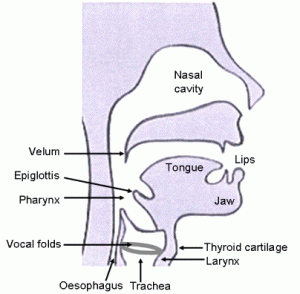 You may experience a certain amount of throat tightness as you sing, especially when attempting the high notes. You may start to strain your throat muscles or even squeeze your throat unnecessarily as you sing higher and higher. Yikes!
You may experience a certain amount of throat tightness as you sing, especially when attempting the high notes. You may start to strain your throat muscles or even squeeze your throat unnecessarily as you sing higher and higher. Yikes!
Here’s the reason for this tightness: The sound of your voice originates from your vocal cords, which are situated in your larynx or voice box, which is in your throat. When you sing, you may subconsciously feel that you need to control your voice with the muscles that you can consciously control. So you activate your throat muscles and this creates strain in your throat as you try to control the notes you sing.
To help become more aware of what you are doing, try practicing in front of a mirror each time you sing or practice your vocal warmup exercises. This way you’ll be able to watch your throat movements and remind yourself to relax your throat as you reach for higher notes.
 Whenever you sing, your vocal cords are subject to muscle tension as well as air pressure. They have to withstand the breath that you apply on them to make them vibrate and produce a sound. Since your vocal cords are situated in your throat, if your throat begins to strain and tighten, you may unknowingly also squeeze your vocal cords. This makes it difficult for the vocal cords to stretch properly and fully to produce the high notes. To sing the high notes, you need to let go of your need for more control and let your vocal cords do their work.
Whenever you sing, your vocal cords are subject to muscle tension as well as air pressure. They have to withstand the breath that you apply on them to make them vibrate and produce a sound. Since your vocal cords are situated in your throat, if your throat begins to strain and tighten, you may unknowingly also squeeze your vocal cords. This makes it difficult for the vocal cords to stretch properly and fully to produce the high notes. To sing the high notes, you need to let go of your need for more control and let your vocal cords do their work.
To some extent, some of your throat tightness can also be attributed to a lack of breath support when singing. When you run out of air while singing, you may try to support your voice with other related muscles and your throat muscles will start to strain and tighten up.
Practicing some breathing exercises for singing, as well as understanding how to achieve good breath support, will help prevent the habit of throat tightening when you sing.
 Do you suffer from end of the day vocal fatigue? Throat tension and vocal stress are common complaints by a lot of people. Many voice problems come from simply being dehydrated or not getting enough sleep. This can also happen from overusing your speaking voice without using the correct placement or support, resulting in accumulated tension.
Do you suffer from end of the day vocal fatigue? Throat tension and vocal stress are common complaints by a lot of people. Many voice problems come from simply being dehydrated or not getting enough sleep. This can also happen from overusing your speaking voice without using the correct placement or support, resulting in accumulated tension.
Since your vocal cords lie within the larynx in the front of your throat, when there is tension in this area, there can be a sensation of tightness, heaviness and even soreness. This can result in a voice with a thin tight sound or an uncontrollably breathy sound. Either one can lead to a sore throat and/or voice problems.
One way to understand more about throat tightness is just to swallow and to yawn. When you swallow your throat constricts slightly. This is the sensation you should try to avoid when singing. (Imagine trying to sing while you are swallowing. It’s really difficult and not very productive.) However, when you yawn, your throat is at its most open state, allowing more air to enter your body through the throat. (Some people can yawn very loudly and start very high!) This is the feeling you want.
So when you sing, try to achieve throat relaxation similar to the feeling of a yawn, allowing your throat muscles to be fully relaxed so your vocal sound can pass through without obstruction. On the contrary, if you try to control your voice by straining your throat when you sing, you’ll find that you’re not able to sing as well and probably be unable to sing the high notes properly.
Exercise For Releasing Throat Tension
1. Put your finger across your throat at the top of your larynx and swallow.
2. Notice the upward motion of the larynx.
3. Now keeping your finger at the top of your larynx, relax and begin a yawn. (It’s the sensation that occurs at the beginning of a yawn that releases tension in the throat. The full yawn brings tension).
4. Notice the downward motion of the larynx. This motion opens the throat and releases tension.
5. Yawn again at the back of your throat without opening your mouth fully. Repeat a few times letting the throat muscles slip downward as you begin to yawn.
6. Repeat the yawn and then exhale by sighing “ah” starting at a comfortably high note in your range and float downward – sounding like a sigh. This is called a “yawn/sigh” and a great way to warm up.
7. Practice releasing tension in your throat with this yawn/sigh motion several times to release throat tension.
There are many other ways to decrease tension in the throat including getting a massage that focuses on your neck and throat muscles, doing yoga to decrease overall tension, and daily neck and shoulder stretches. Also keep in mind that tension in your voice can result from stress or the inability to “speak up” for what you want or need. Psychological tension can result in physical constriction and tension in this area. Talking things out with a trusted friend or therapist can be helpful. A physical therapist or acupuncturist can also help alleviate tension in these areas. Energy work on the chakras is another approach for those of you who are open to alternative methods.
Your throat is the center of your self-expression. Let it relax so you can fully express yourself!

This is so helpful. Have a chronically sore throat, raspy from trying to sing!
This feels like a great way to tackle the problem and it’s reassuring to understand what is happening.
Thank you!
You’re welcome. I’m so glad to hear that this is helpful information for you!
Very timely help, Ellen. This has begun to occur more often than in the past, so I appreciate the specific remedies you offer–they make sense.
I hope these tips help you deal with this in the future!
You will not believe what just happened? Since march 2019 I was suffering from a throat tightness, went to doctors and ENT, and Pulmonologists even I ended up taking psychiatric therapies, everyone said you have Anxiety Anxiety Anxiety.
Until today I was surfing and decided to surf my throat tightness, just read the exercise and voila! The tightness is like disappeared? I dont believe this, so all this time I had nerves issues not anxiety? how come the doctors are so full of …..t these days?!! Thank you so much ellen
I’m so glad this was helpful for you.
Can u please help… do we yawn fully or not??
Yes, yawn fully unless you experience pain or hear a cracking noise. If so, your jaw may be out of alignment and you may want to seek extra attention from a dentist, osteopath or chiropractor.
I’ve just realised that I tighten my throat to the point of strain when I try to hit any higher notes. What about nasal contraction? I feel the rear, top of my throat pinch off in order to produce higher pitches. Is that good or bad?
If I shouldn’t contract my throat, how do I manage to hit those higher notes?
Do you know any articles that explain how singing should feel?
It sounds like you have developed some good awareness of sensations that are happening in your body as you are singing. This is great and exactly what you need to develop as a singer.
In general, there shouldn’t be any straining or pinching feeling as you sing. Your throat can remain relaxed no matter what pitch you are singing. It is important to get enough air and use it in a way that allows your throat to stay open and without tension. The rear top of your throat is called the soft palate and it can move upward to create more space for high notes. Ideally singing can simply feel like air passing over the vocal cords and resonating or buzzing in the head and face.
It’s difficult to respond to your questions (which are good ones) without actually working with you in person. I would recommend that you find a good vocal coach who can address your specific situation and take a couple of lessons.
my voice whistles when i try to switch chest voice to head voices and i cant hit notes i have hit before.
Sometimes as we age our vocal cords lose some of their elasticity and notes that use to be within reach become difficult to sing. Not sure what you mean by “whistle” and I’m not able to give advise about this without actually hearing you sing.
I just tried the beginning of the yawn method and it worked! I was much more able to sing the high notes. (I was practicing Berceuse with Placido not in person though I wished.). Thank you.
I’m so glad to hear that you experienced a difference! That is great and thanks for letting me know. Oh yes, too bad Pacido was not there to hear you ;+)
My throat has been tight for MONTHS.. and it’s scary every time I swallow, like it might suddenly close up without warning. This in turn gives me anxiety, which makes it even worse. I KNOW it’s my voice box/vocal chords though because I sang all the time, every day, and I even began yelling some, won’t go into detail there though right now. I’ve been to ENT and they gave me a swallow study which turned out fine, and also ran an endoscope down my throat and said the vocal chords look fine.. But I know it’s the culprit because it happened soon after I started singing so much. Where can I go to get more in depth treatment and a better diagnosis?? Please and thank you.. it’s been very unpleasant these past few months.
Hi Dustin,
It does sound like an anxiety provoking situation. It’s difficult for me to comment just from a description but my first thought would be about your thyroid and having that checked. The other is acid reflux which also has influences swallowing. Those are the two most common causes I have come across. I hope that’s helpful.
Good luck.
I feel pain in front of neck when ever I look upwards…
Can u pls help me???
Please give me more specific information so I can get a clearer picture of what’s going on for you.
Hi Ellen,
I practice Indian light music. My voice really deep, I can go to note c on the lower octave of harmonium very easily. I really like singing high notes but I can’t sing on high notes, whenever I try to sing on high notes I strain my voice a lot and I end up hurting my throat, can this exercise help, or can you tell me exercises to sing on high notes, please.
If you have a deep voice you may not be able to sing certain high notes because they are not in your range. It should never hurt to sing. If you are straining and hurting your throat it is sign to stop singing. You may be able to sing these high notes in falsetto. However, the first thing to do is work with someone to find out what your vocal range is and if these high notes are even reachable for your particular voice. If they are not, then no exercise will help you do so. You may need to try singing the song in a lower key that is within your vocal range.
Thanks to you I can better understand what’s restricting my throat at higher notes. Your act of spreading knowledge is a very compassionate and kind gesture, more power to you!
I’m so glad to hear that this information has been helpful for you!
I don’t think my voice or throat feels “tight”, but some of the muscles between my throat and my jaw feel like I stretched them too much at some point. I recently volunteered at a camp and then attended another, both requiring me to use my voice a lot (it’s been nearly a week since the second camp ended). When I sing (I’m a tenor 2), I barely feel anything in my chest, and most of the vibration seems to be coming from my upper throat. It’s not painful, but I don’t think that’s what I should be feeling. I don’t quite remember what singing felt like before these camps, so I don’t have a basis for comparison, but could this be vocal fatigue?
It’s difficult to say without actually hearing you. Sounds like you may have strained your vocal cords. This is not uncommon when trying to be heard by groups in large rooms or outdoor settings without using any amplification. The best thing for recovery is always vocal rest…meaning silence, and no whispering. Give it at least a week like this before trying to sing again since singing is the most demanding activity for the voice. If it continues I would recommend seeing an ENT or autolaryngologist just to check things out thoroughly and make sure you will not aggrevate the situation further.
I started to hydrate more recently and I started to tell that I had this so these tips really helped!
I’m glad to hear that things are improving!
Thank you so much for this article! Often when I try to yawn, I am unable to fully complete it. It feels like the yawn is getting blocked/stuck in my throat/neck…I think bc those muscles are so tight. Do you know anything about that?
I have not heard of a yawn getting stuck but if your throat is tight that could make the difference. Perhaps check with your doctor.
Hi where is larynx. Please advise
Look in the first diagram in this post. It’s at the bottom of this picture and marked “larynx.”
I used to hit higher notes just fine but I’ve noticed in the last month or two when I’m trying to sing in my higher range, my vocal chords strain, become somewhat painful and I get the sensation to cough. Will these exercises help with that? Is there anything more I can do?
Depending on how old you are, it could be part of the aging process as muscles lose their elasticity, and things we formerly could “get away with” we can’t anymore.
Make sure you are getting enough sleep, drinking enough water, eating well, and warming up before launching into the high register.
Take a few one on one lessons with a good vocal teacher who can listen and watch you sing and give you specific advise for your voice. If you have not been singing correctly it may be catching up with you. There are no exercises that will help because you will just be doing them incorrectly as well.
This is so informative, I have been a singer for over 50 years and retired around 8 years ago, I joined a singing group and for the first time in my life experienced this awful tightness thing, which prompted me to not even attempt the notes at the top of my range, I am now using your technique however I am still having difficulty.
Any help would be very gratefully received as the song they have picked for me to do is ‘As if we never said goodbye’ from sunset boulevard, the acting part I have no problems but the upper register is killing me.
I’m glad you found this information helpful. Unfortunately there is no quick fix or “one size fits all” solution for throat tightness. Each person has their own unique instrument and set of circumstances that contribute to vocal challenges. The fact that the upper register is “killing you” obviously indicates that there is something wrong and working one to one with a vocal coach is your best bet. That way you can get the individual instruction you need, and you deserve. Good luck!